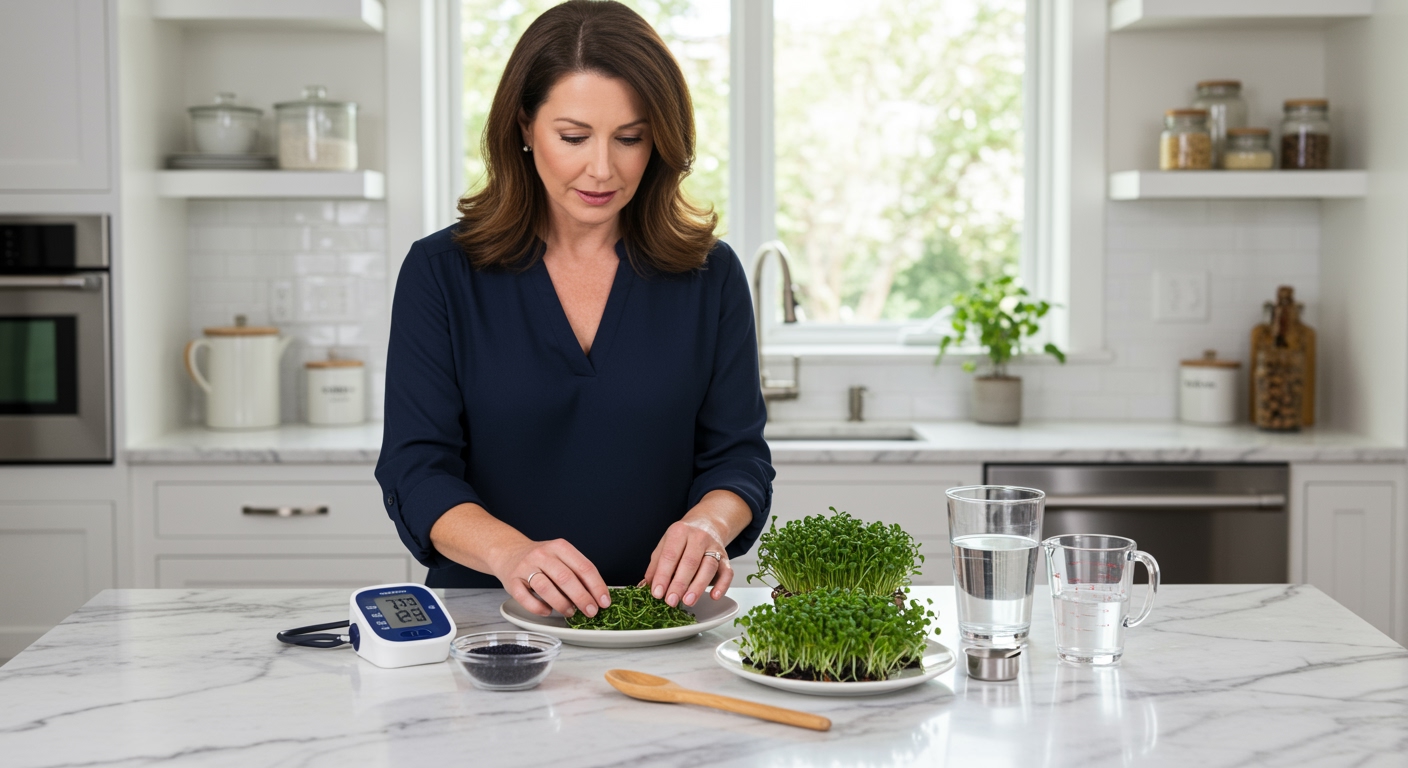✪ Key Takeaway: Nigella sprouts may lower blood pressure further in people with existing hypotension due to their potent bioactive compounds.
Introduction
Your blood pressure dropped to 90/60 mmHg again, and now you wonder if those trendy nigella sprouts in your salad are making things worse.
Many people with low blood pressure worry about foods that might push their numbers even lower, especially when trying new superfoods like nigella sprouts.
Hi, I’m Abdur, your nutrition coach, and today I’m going to explain whether nigella sprouts can worsen your low blood pressure and what you need to know to stay safe.
What Makes Nigella Sprouts So Powerful?
Nigella sprouts come from black cumin seeds that have been germinated for several days until tiny green shoots emerge.
These sprouts contain concentrated amounts of thymoquinone, the primary bioactive compound responsible for most of nigella’s health effects.
During the sprouting process, the seed’s nutrient profile changes dramatically, creating higher levels of antioxidants and bioactive compounds than the original seeds.
Research shows that sprouted seeds generally have 2-3 times more bioactive compounds than their unsprouted counterparts, making nigella sprouts particularly potent.
The sprouting process also breaks down complex compounds into more easily absorbed forms, which means your body can utilize these blood pressure-affecting compounds more efficiently.
✪ Fact: Sprouting increases thymoquinone bioavailability by up to 300% compared to whole seeds.
How Do Nigella Sprouts Affect Blood Pressure?
Nigella sprouts work through multiple cardiovascular pathways that can significantly impact your blood pressure readings.
The thymoquinone in these sprouts acts as a natural ACE inhibitor, blocking the enzyme that converts angiotensin I to angiotensin II, a powerful blood vessel constrictor.
When angiotensin II levels drop, your blood vessels relax and widen, leading to reduced blood pressure throughout your circulatory system.
These sprouts also contain compounds that enhance nitric oxide production in your blood vessel walls, further promoting vessel dilation and blood flow.
Additionally, nigella sprouts have mild diuretic properties, meaning they can increase urine production and reduce the volume of fluid in your bloodstream.
Studies indicate that regular consumption of nigella products can lower systolic blood pressure by 5-10 mmHg and diastolic pressure by 3-7 mmHg in healthy individuals.
✪ Pro Tip: Monitor your blood pressure for 2 weeks after introducing nigella sprouts to track any changes.
Can Low Blood Pressure Get Dangerous?
Low blood pressure becomes problematic when it drops below 90/60 mmHg and starts causing uncomfortable symptoms in your daily life.
Common signs include dizziness when standing up, fatigue, blurred vision, and difficulty concentrating throughout the day.
When your blood pressure drops too low, your organs may not receive adequate blood flow and oxygen, leading to reduced function and energy levels.
Severe hypotension can cause fainting episodes, which pose serious risks if they occur while driving, climbing stairs, or operating machinery.
For people already dealing with low blood pressure, adding blood pressure-lowering foods like nigella sprouts could push their numbers into the danger zone.
The risk increases if you take blood pressure medications, have heart conditions, or experience frequent dehydration.
✪ Note: Blood pressure below 80/50 mmHg requires immediate medical attention regardless of symptoms.
Should You Avoid Nigella Sprouts With Hypotension?
You do not need to completely avoid nigella sprouts if you have low blood pressure, but you should approach them with careful moderation.
Start with tiny amounts, perhaps just a pinch sprinkled on your salad, and monitor how your body responds over several days.
Keep a blood pressure log for two weeks, checking your readings at the same time each day to identify any concerning patterns.
If you notice increased dizziness, fatigue, or your blood pressure readings drop below your normal range, reduce or eliminate the sprouts temporarily.
Consider consuming nigella sprouts with meals that naturally support healthy blood pressure, such as those containing adequate salt and protein.
Always consult your healthcare provider before adding nigella sprouts to your diet if you take blood pressure medications or have cardiovascular conditions.
✪ Pro Tip: Limit nigella sprouts to 1 teaspoon daily if you have blood pressure below 100/70 mmHg.
The Bottom Line
Nigella sprouts can indeed worsen low blood pressure due to their potent blood pressure-lowering compounds, but complete avoidance is rarely necessary.
Smart nutrition means knowing your body’s limits and respecting them, not avoiding every food that might cause concern.
I would love to hear about your experiences with nigella sprouts or any questions you have about managing low blood pressure naturally – please share your thoughts in the comments below.
References
At NutritionCrown, we use quality and credible sources to ensure our content is accurate and trustworthy. Below are the sources referenced in creating this article:
- Elsevier: Mechanisms of antihypertensive effects of Nigella sativa
- PubMed: Nigella sativa and its active constituents thymoquinone shows antihypertensive effect
- Wiley Online Library: Antihypertensive Effect of Nigella sativa Seed Extract in Patients with Mild Hypertension
- Medical News Today: What to know about low blood pressure





